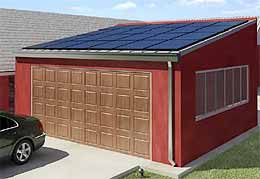[youtube]z1WtzpTMoGA[/youtube]


Solar Carport
& Charging Station
Designed, patented, and produced by Merit Builders, the Solar Carport and Charging Station provides a low-cost alternative to solar panel installation when conventional sourcing from an existing rooftop isn't feasible. Our solar collectors laminate directly to traditional metal roofing materials and are ideal for both commercial and residential use. The Charging Station offers the potential of powering nearby buildings or can serve as a charging station for electric-powered vehicles. The carport can be designed to accomodate your specific needs. See this innovative energy producing structure in use at Merit Builders' company headquarters.

Last edited:















